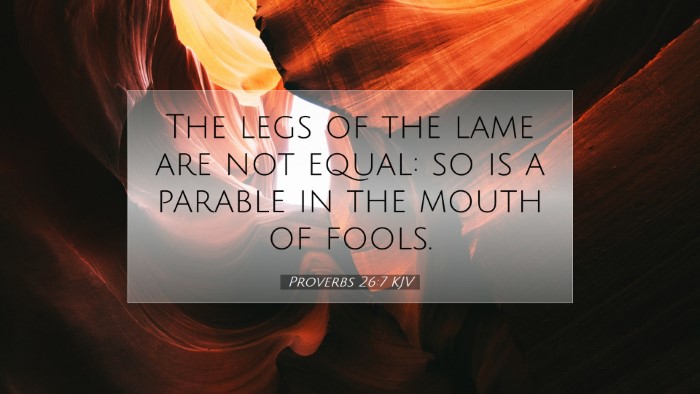Commentary on Proverbs 26:7
Proverbs 26:7 states, "Like the legs of the lame, so is a proverb in the mouth of fools." This verse serves as a profound metaphor illustrating the ineffectiveness of wisdom when it is in the hands of those who cannot comprehend or utilize it appropriately.
Insights from Public Domain Commentaries
Matthew Henry's Commentary
Matthew Henry emphasizes the contrast between wisdom and foolishness presented in this verse. He notes that a proverb's value is diminished when spoken by a fool, much like how the legs of a lame person are ineffective for walking. Henry remarks that the wise sayings intended for moral instruction lose their potency when uttered by one lacking the discernment to appreciate their meaning. Thus, the verse admonishes the readers to be cautious about who they allow to speak into their lives, stressing the importance of distinguishing between wise counsel and foolish talk.
Albert Barnes' Notes on the Bible
Albert Barnes contributes to our understanding by elaborating on the nature of proverbs in biblical literature. He asserts that proverbs are designed to impart wisdom, yet when they come from someone who lacks genuine understanding, they are rendered useless. Barnes likens this phenomenon to an absurdity; just as a crippled person cannot walk on their legs, a fool cannot apply godly wisdom, leading to a misinterpretation that might even cause harm. Thus, the proverb warns against using wise sayings inappropriately, highlighting the necessity for those dispensing truth to possess the maturity required to convey such insights effectively.
Adam Clarke's Commentary
Adam Clarke offers additional layers to this commentary by analyzing the implications of the metaphor in the context of the book of Proverbs as a whole. He views the metaphor of the lame legs as an illustration of the disconnect between the intended purpose and the actual function. Clarke suggests that prattling fools may repeat wise sayings, yet their lack of wisdom prevents them from grasping the essential lessons embedded within such descriptions. Clarke encourages readers to seek out wise counsel from those who not only understand the proverbs but also live by them. He warns that failure to discern this leads to a society where wisdom is trivialized, undermining the seriousness of divine teachings.
Theological Implications
This verse raises profound theological implications regarding the nature of wisdom and the role of the speaker in imparting truth. Wisdom should be sought with the intent of ethical application, and it emphasizes God's design that His truths be communicated through vessels equipped to handle them.
- Divine Wisdom: The proverb aligns with numerous Scriptures emphasizing the importance of wisdom as a divine attribute.
- Human Responsibility: There exists an expectation for individuals to gain wisdom that transcends mere knowledge, fostering a degree of responsibility among those who wish to share such insights.
- Personal Accountability: Each believer bears the responsibility to discern who speaks into their lives and to ensure alignment with godly wisdom.
Practical Application
Pastors, students, and theologians are encouraged to reflect on the practical application of this verse in today’s society. As the pervasiveness of information increases, so does the number of voices disseminating wisdom. Understanding the distinction made in this verse can protect believers against the dilution of truth by foolish speech.
- Discernment: Cultivating a spirit of discernment is paramount for all who wish to receive and share wisdom.
- Mentorship: Engaging with wise mentors can help individuals navigate the complex layers of biblical wisdom.
- Living Wisely: The call to embody wisdom in our daily actions is reiterated, creating an opportunity for the community to see practical Christianity in action.
Conclusion
Proverbs 26:7 invites reflection on the impact of wisdom and its rightful use. The commentary from these respected theologians illustrates that profound truths of Scripture may falter in influence when handled by the unwise. As followers of Christ, it serves as a reminder to seek wisdom earnestly, to speak it prudently, and to recognize the significance of who conveys that wisdom. In so doing, the community not only honors God but also becomes a beacon of hope and clarity in a world desperately searching for sound counsel.


